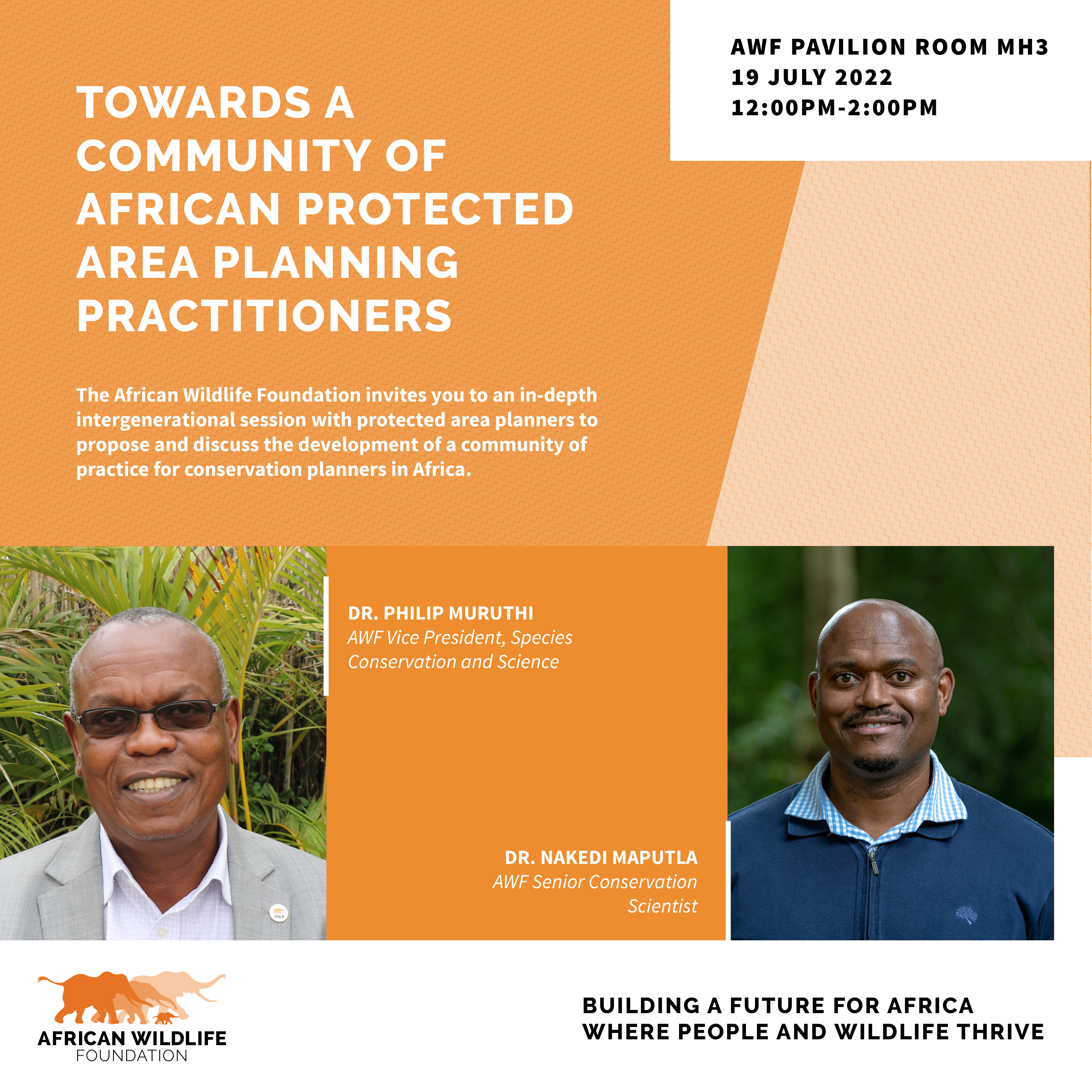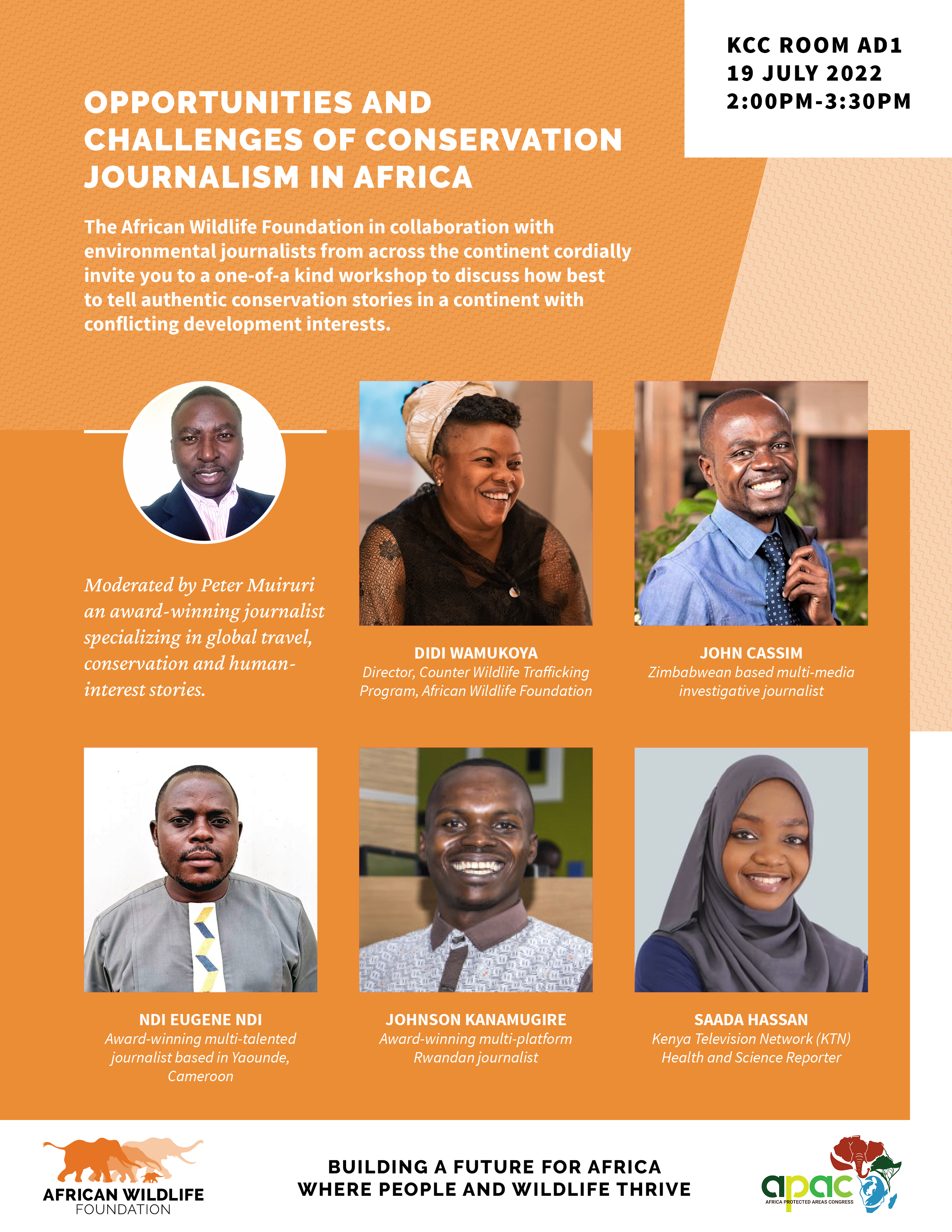AWF at APAC: Day 2 - Tuesday 19th July 2022
High level Plenary – Challenges & Opportunities of Protected & Conserved Areas
8:30-10:00 - Auditorium
- This Leadership Dialogue will synthesize the key challenges and opportunities of Protected and Conserved Areas (PCAs) in Africa to: a) set the tone and introduce the congress; b)present the status of PCAs in Africa and their major challenges (especially management effectiveness and governance); c) introduce the ambition of new target and challenges to achieve it – in marine and terrestrial realms; and where opportunities lie and how to seize them, with a focus on OECMs. There will be a special video on the status of PCAs with panel reflections. - Shamila Nair – Bedouelle, Assitant Director General UNESCO () will moderate this Leadership Dialogue. Key Note Addresses by: 1. Hon. Paula Francisco Coelho, Secretary of the State for Environment, Republic of Angola 2. Kaddu Sebunya – African Wildlife Foundation CEO There will be a panel with the following panelists: Hon Lee White, Ministre des Eaux, des Forêts, de la Mer, de l’Environnement , Chargé du Plan Climat and du Plan d’Affectation des Terres, Gabon Juliette Biao Koudenoukpo, Executive Director, UN Forum on Forests Amy Fraenkel, Executive Secretary of the Convention on the Conservation of Migratory Species of Wild Animals Alfred Oteng – Yeboah, Chair of IPBES / IPCI steering committee Marco Lambertini, Director General WWF International Video: Elizabeth Maruma Mrema, UN CBD This will be followed by an open question and answer session and a concluding summary by the moderator..
- Philip Muruthi is the session staffer
Introduction to APAC Streams and Themes
10:30-12:00 noon - Auditorium
- This session will inform participants of the scope and direction of each APAC Stream. This is an opportunity for participants to identify sessions that interest them. The session will emphasize the Congress with a “Call for Action”, and link the Leadership Dialogues (Challenges and Opportunities of Protected and Conserved Areas) to the rest of the APAC agenda. The session will be exciting, graphic and visual, with short films linked to different streams and cross-cutting themes, and experts speaking about each of the thematic areas.
- This session is moderated by Kaddu Sebunya
Towards a Community of African Protected Area Planning Practitioners
12:00-14:00 - AWF Pavilion
- This presentation proposes the development of a community of practice for conservation planners in Africa. Evidence of such a structure in Africa is lacking apart from the Conservation Measures Partnership’s Open Standards for the preparation of conservation and the Conservation Coaches Network.
- This session will be led by Philip Muruthi, AWF's Vice President Species and Conservation Science alongside Nakedi Maputla, AWF Senior Conservation Scientist

Stream 1 Parallel Plenary: Promoting effective and equitable networks of PCAs (protected and conserved areas) in Africa
14:00-17:30 - Auditorium
- Panel 1: How effective are protected areas in conserving biodiversity and ecosystem services– constraints and opportunities for management effectiveness (including representativity, connectivity) Panel 1 will be moderated by Daniel Marnewick (IUCN) who will introduce the status of PCA effectiveness and how it relates to the Aichi targets, equity, fairness, participation and sustainability. Amy Fraenkel (Executive Secretary of the Convention on the Conservation of Migratory Species, CMS) will make one keynote address on CMS and Africa regional perspectives, including the link between connectivity and effectiveness.
- There will be a keynote address by APAD (Dr Charles Musyoki, Kenya), who will discuss PA management effectiveness for Africa. This will include a summary of the main challenges and opportunities for management effectiveness of PAs in Africa. There are 5 panelists: Patience Gandiwa (Zimbabwe Parks), Kaori Yasuda (IUCN-Rwanda), Jimmiel Mandima (IFAW), and Abilio Rachid SAID (Instituto da Biodiversidade e da Áreas Protegidas, Guinea Bissau). After the panelists have made their presentations, the audience will break into groups to discuss various questions and issues: How can we improve the management effectiveness of protected and conserved areas in Africa? What lessons are we learning? What actions do we need to implement? What are the gaps and how can we fill them?
Opportunities and Challenges of Conservation Journalism in Africa
14:00-15:30 - AD1
- Media workshop: Despite a wealth of information on conservation, it is unclear how information reaches the public due to insufficient interaction. With experts at APAC, we want to see how this gap can be closed by helping journalists interpret scientific findings into a simple non-scientific language (Muiruri, 005-PCA-STIK) (2)
As journalists based in Africa, we have primarily focused on the negative impacts of human activities on the environment, ignoring the key milestones and successes aimed at reversing the continent's biodiversity loss. A third of the world’s biodiversity is in Africa, and we have a role in ensuring that these limited resources are protected and understand why we need the latter for our basic survival, let alone for us and future generations to thrive. AWF, through media labs, has been building the capacity of African journalists to tell conservation stories. This media workshop will create a space where we can have genuine and open conversations on what gaps we are experiencing within the conservation space as journalists. These conversations between experts and the media will create a positive shift towards being part of the change needed within the next decade.

Conservation Giants Workshop
16:00-17:30 - T3
- Workshop: Conservation leaders reflect on successes & failures to advance conservation in a rapidly changing Africa. Intergenerational dialogues are key for conservation leaders’ past to share experiences for emerging leaders for the work ahead. 102-PEO-BIO-GOV-CC-SUF (2)
- The successes and failures of established conservation leaders provide invaluable lessons for emerging leaders. Their experience and insights are invaluable as emerging leaders wrestle with current and future challenges related to biodiversity loss. It is, therefore, critical to nurture more African leaders who can safeguard the continent’s biodiversity and leverage it for Africa’s future generations. Simangele Msweli, AWF’s Senior Manager, Youth Leadership Program, will, in this workshop, moderate a discussion in which conservation leaders will reflect on the successes and failures to advance conservation in a rapidly changing Africa. Such intergenerational dialogues are fundamental for past conservation leaders to share experiences with emerging leaders for the work ahead.
Great Apes Policy Brief Launch
17:00-19:00 - ACBA Pavilion
- Conservation Through Public Health (CTPH) and International Gorilla Conservation Programme (IGCP), together with African CSOs (Civil Society Organizations) Biodiversity Alliance (ACBA (African CSOs Biodiversity Alliance)) developed a Great Apes policy brief that will officially be launched at APAC in Kigali to set out new great ape tourism guidelines for adoption by African governments and other key stakeholders, to better protect Africa’s great apes from diseases.
- Philip Muruthi, AWF's Vice President Species and Conservation Science will be delivering a keynote address at the launch